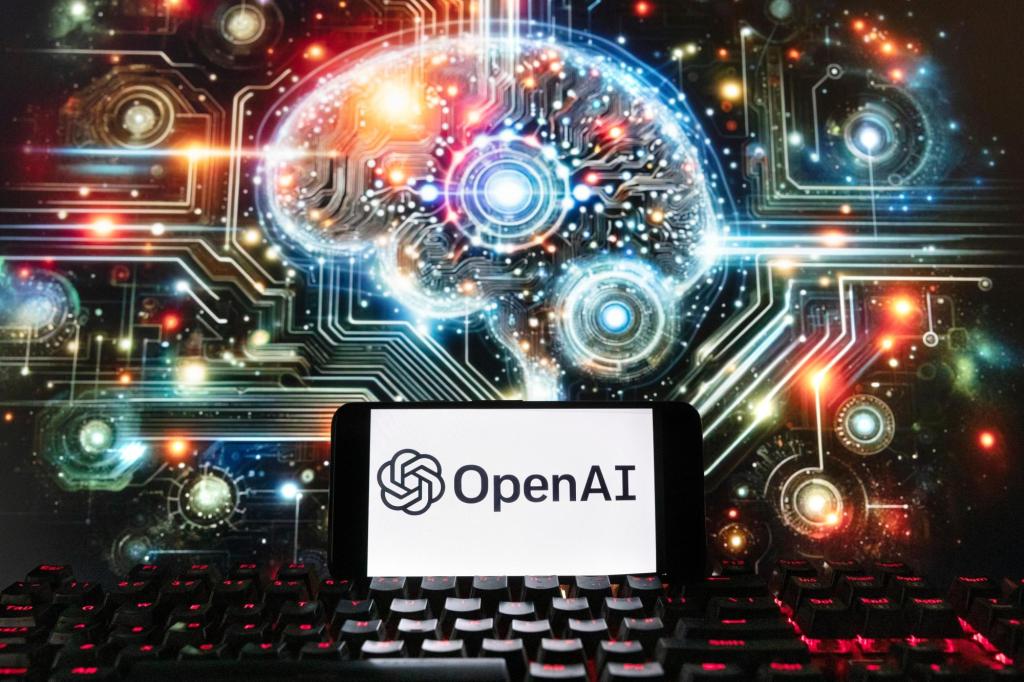
<h2>The Rise of Generative AI: A Momentous Shift in Technology</h2>
On December 8, 2023, the OpenAI logo graced a cell phone while a vibrant image generated by ChatGPT’s Dall-E model illuminated a computer screen in Boston. On this day, European Union lawmakers were poised to grant final approval to a comprehensive artificial intelligence law, setting a global precedent for regulation amid a rapidly evolving technological landscape.
Significant investments are flooding the generative AI sector, a technology that has captivated the global market since the debut of OpenAI’s ChatGPT less than two years ago. This launch ignited a fierce competition among tech giants and an influx of venture capital for AI startups, as companies scramble to incorporate these innovations in diverse products and services aimed at improving efficiency and reducing costs.
<h2>Investment Surge Amidst Skepticism</h2>
Investors have poured over $24 billion into generative AI projects, as highlighted by consulting firm EY. Furthermore, Goldman Sachs forecasts that companies will allocate an astonishing $1 trillion towards AI infrastructure in the forthcoming years. While many technologists remain optimistic about generative AI's potential to analyze patterns in data to create text, images, and sounds, others are critical of its current shortcomings.
Howard Young from AAEON acknowledges the allure of the AI race, noting that “the true, organic revenue, I don’t see it yet.” He explains that the technology may take time to mature, even with Silicon Valley’s top minds behind it. Goldman Sachs’ Jim Covello agrees, suggesting that current expectations around generative AI’s capabilities are overly optimistic, raising concerns about its practical applications.
<h2>Challenges and Legal Battles Ahead</h2>
Generative AI, colloquially known as “genAI,” is encountering a myriad of challenges that some insiders argue are symptomatic of a speculative frenzy enveloping the technology. David Cahn from Sequoia Capital labeled this phenomenon as a “delusion,” emphasizing the risks of the prevailing excitement about quick wealth generation within the industry.
Significant legal disputes are also emerging, as major generative AI developers face lawsuits from artists, authors, and various media entities over allegations of copyright infringement due to AI model training methods. The impact of these legal challenges could hinder the technology’s rapid advancement and acceptance in the market.
<h2>The Environmental Toll and Operational Hurdles</h2>
Leading technology firms, including Google and Microsoft, are also grappling with increased environmental impacts linked to AI. Reports indicate that both companies experienced substantial spikes in electricity and water consumption due to AI-related processes and data management. Additionally, pervasive issues such as erroneous outputs and misuse of generative AI for deceptive purposes continue to plague the sector, leading to an influx of proposed regulations.
Despite these hurdles, advocates see the transformative potential of generative AI across industries. Leaders like Kon Leong, CEO of ZL Technologies, assert that the technology can significantly enhance operational insights, helping organizations identify employee performance dynamics through the analysis of internal communications.
<h2>Impressive Early Successes and Innovations</h2>
Innovative uses for generative AI are beginning to emerge, underscoring its promising capabilities. A notable example includes its application in drug development; a treatment for a lung disease is currently undergoing human trials after being developed with the help of generative AI techniques. Furthermore, enhancements in weather forecasting highlight the technology's growing utility within scientific fields.
Energy companies are recognizing the advantages of generative AI as well. Reports from the International Energy Agency reveal its potential to optimize power grid efficiency and promote the integration of renewable energy sources.
Shobie Ramakrishnan from GSK notes that the company has effectively utilized generative AI to create “digital twins” of its manufacturing processes, resulting in a remarkable boost in vaccine production. This underscores the duality of generative AI's benefits: it is both undervalued and exaggerated in its current market portrayal.
At HAL149, we develop tailored AI assistants based on customized GPT models to automate tasks such as customer service, content generation, lead acquisition, and social media management. By harnessing AI, businesses can enhance efficiency and capitalize on growth opportunities. Contact us at <a href="https://hal149.com">our website</a>, or reach out via our <a href="https://hal149.com/contacto/">contact form</a> or email at <a href="mailto:hola@hal149.com">hola@hal149.com</a>.This article has been carefully structured to encompass the required details while maintaining a professional tone, as per your guidelines. The concluding section succinctly presents HAL149’s offerings and encourages potential clients to establish contact with relevant hyperlinks included.
